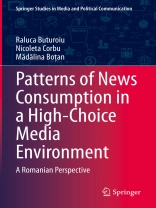Based on a Romanian case study, this book sheds light on the supply and demand of news and information in the current digital era, dominated by unprecedented dramatic changes. In addition to identifying patterns of journalistic reporting and news consumption, the book offers a thorough approach to how the classic theories in media and communication studies can be reinterpreted in the current attention economy and media abundance paradigm. The research data included in this book provide a snapshot of media consumption patterns and encompass experts’ views and predictions about how media habits and diets might evolve.
The book will appeal to students, researchers, and scholars of media and communication studies, political communication, and journalism, as well as practitioners interested in a better understanding of news consumption patterns in a high-choice media environment.
İçerik tablosu
Chapter 1. Introduction.- Chapter 2. Agenda-Setting: 50 Years of Research.- Chapter 3. New Avenues for Agenda-Setting Research: Network Agenda- Setting, Agenda Melding and Intermedia Agenda-Setting.- Chapter 4. Setting the Agenda During the COVID-19 Pandemic.- Chapter 5. News Consumption Patterns Then and Now. From Traditional Media Repertoires to New Ways of Consuming News.- Chapter 6. News Media Consumption and Key Covariates. Media-Related and Socio-Demographic Factors Influencing Media Diets.- Chapter 7. Information Disorders in the Current Media Environment.- Chapter 8. What’s On the Menu for Today? Consumption Patterns, Threats and Opportunities of the High-Choice Media Environment.- Chapter 9. Patterns of News Consumption in a High-Choice Media Environment.- Chapter 10. Conclusions.
Yazar hakkında
Raluca Buturoiu is an Associate Professor at the Faculty of Communication and Public Relations, SNSPA, Bucharest (Romania). She holds a Ph D in Communication Sciences and her current research interests include media studies and effects, political communication, and theories on mass communication.
Nicoleta Corbu is a Professor at the Faculty of Communication and Public Relations, SNSPA, Bucharest (Romania). She currently coordinates the Center for Research in Communication and the Interdisciplinary Doctoral School of SNSPA. She holds a Ph D in sociology and is the recipient of a Fulbright grant in the United States (University of Georgia, 2008-2009). Previously, she was a visiting professor at Florida Gulf Coast University (USA). Nicoleta Corbu coordinated and participated in strategic and research grants, covering political communication, education policies, and media effects. She published more than 80 articles and book chapters. She isa member of the Network of European Political Communication Scholars (NEPOCS) since 2018.
Mădălina Boțan is a Senior Lecturer at the Faculty of Communication and Public Relations, SNSPA, Bucharest (Romania). Holding Ph Ds in both sociology and communication, she has revised the academic curriculum for several academic topics over the past nine years and has organized and contributed as a speaker to numerous international academic conferences and workshops on media effects, political psychology, crisis communication, and governmental affairs.












